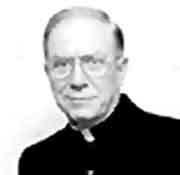 | Father Richard James Cleary was born and reared in Wichita. After graduation from Cathedral High School in 1947, he attended the seminary operated by the Benedictine monks of Conception Abbey in Northwestern Missouri. There he came to appreciate the life of the monks and, having obtained the permission of Bishop Mark Carroll of Wichita, he became a monk of that monastery. After being ordained a priest in 1955, his superiors sent him to get his master’s degree at the University of Ottawa, Canada, then to study in Athens, Greece, and then in Rome, Italy, where he obtained his doctor’s degree in Theology. Finally, he spent a year of study at Harvard University. Later, Fr. Cleary was assigned to teach for many years in Rome. In 1998, he returned to Wichita, where he served in parish ministry at St. Mary’s Cathedral and at Blessed Sacrament parishes. In 2001, his abbot (superior) transferred him to Arkansas, where he served as chaplain of the Benedictine Sisters of Holy Angels Convent in Jonesboro, and helped in the parishes of northeast Arkansas. In March 2010, he was re-assigned to his monastery, Conception Abbey, Conception, in Missouri 64433. He can be contacted there at, 660-944-2877, or by email: rjcleary@juno.com. |
Religion
2004-02-01 09:19:00
What does it mean to get the ‘Holy Spirit’?
Answer: The expression "Get the Holy Spirit" is a phrase lifted out of context and can be used in whatever way the speaker or writer intends. The context is the New Testament Gospel of St. John or Acts of the Apostles. In the Gospel Jesus promises to send the Holy Spirit (John 15:26), and later actually imparts the Holy Spirit, when he says to his Apostles: "Receive the Holy Spirit" (John 20:22). Acts of Apostles relates the coming of the Holy Spirit upon the primitive Christian community on the day of Pentecost: "They were all filled with the Holy Spirit, and began to talk in other languages, as the Holy Spirit enabled them to speak" (Acts 2:4). Acts 19:6 relates about St. Paul's converts at Corinth: "They were baptized in the Name of the Lord Jesus. Paul placed his hands on them, and the Holy Spirit came upon them; they spoke in strange tongues and proclaimed God's message." In his first epistle to the Corinthians St. Paul speaks of a variety of gifts of the Holy Spirit, and different ministries for which the Spirit equips different individuals (cf I Cor 12:3-11). These texts and others show various distributions of God's Holy Spirit. The Spirit is manifested in a variety of virtues as well as of talents given to individual persons in different places and under various circumstances. Among these gifts is that of speaking in tongues (foreign languages). Most of us have to learn a foreign language with effort, study and practice with someone familiar with that language (usually by personal contact or recorded tapes). But at times the Holy Spirit will give to particular individuals, as He did to the Apostles, the charism of being understood in languages they have not studied or experienced. Some missionaries (e.g. St. Francis Xavier) have received this gift. But speaking in tongues is not the same as "to get the Holy Spirit." It is one evidence of the Spirit, but not to be identified with God the Holy Spirit. Why do some religions not believe in this? Ask them, it's their problem. Followers of such religions pick and choose from the Bible and other books whatever they wish to believe, and they reject whatever they don't like. The gift of speaking in tongues is not a common characteristic of Christians. It is exceptional. Most persons, who are fluent in several languages, acquired those languages by their own efforts. Sometimes, among certain fundamentalist groups, the members allege that they speak in tongues, but what comes out of their mouths is unintelligible babble or their own particular agenda, as with soothsayers and palm-readers pretending to have uncommon knowledge. This babble is not from God the Holy Spirit. There are persons who, under hypnosis or drugs or craving attention, pretend to "get the spirit." Whatever spirit they allege might come from hallucination or imagination or the devil. And, of course, there are bottled spirits available at any liquor store. Patrons thereof can also "get the spirit," perhaps of Jack Daniels or Chivas Regal etc. And then there is the "spirit of Christmas" and other occasions of celebration.


